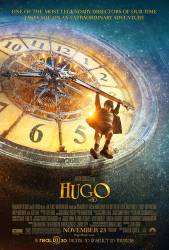Visible crew/equipment: When Hugo's father is explaining him about the automaton, a screen with letters (very likely a prompter) is reflected on his glasses.

Hugo (2011)
1 visible crew/equipment mistake - chronological order
Directed by: Martin Scorsese
Starring: Christopher Lee, Ben Kingsley, Chloe Grace Moretz, Asa Butterfield
Continuity mistake: After Frick brings the dog, while Hugo is looking at the inspector, the luggage porter walks behind Hugo twice.
Isabelle: This might be an adventure, and I've never had one before - outside of books, at least.
More trivia for Hugo
Question: What song is playing in the background when the Station Inspector is flirting with the Flower Girl and asks her about her flowers?
Join the mailing list
Separate from membership, this is to get updates about mistakes in recent releases. Addresses are not passed on to any third party, and are used solely for direct communication from this site. You can unsubscribe at any time.
Check out the mistake & trivia books, on Kindle and in paperback.



